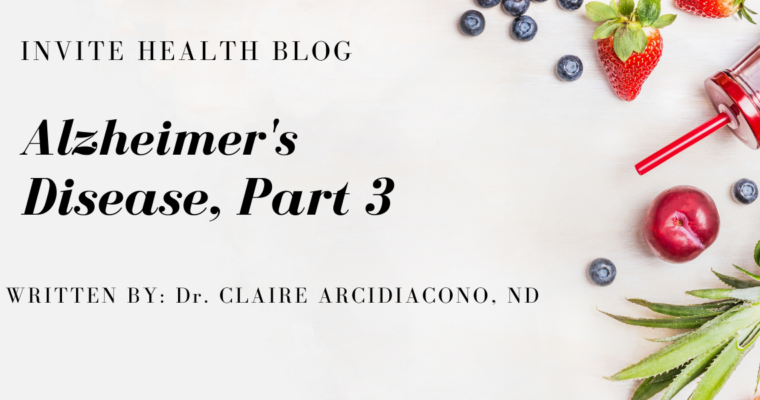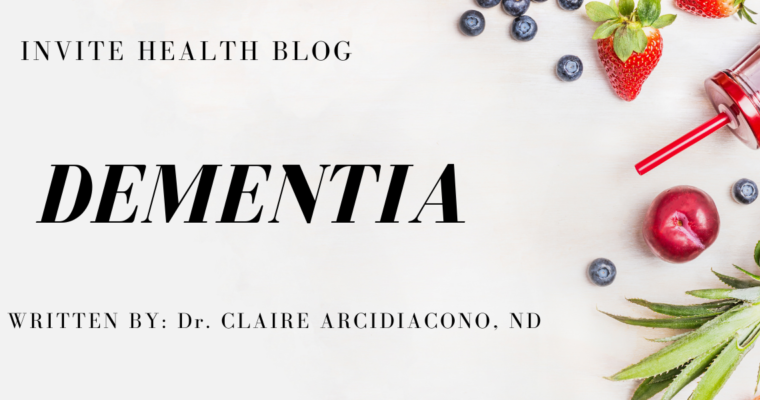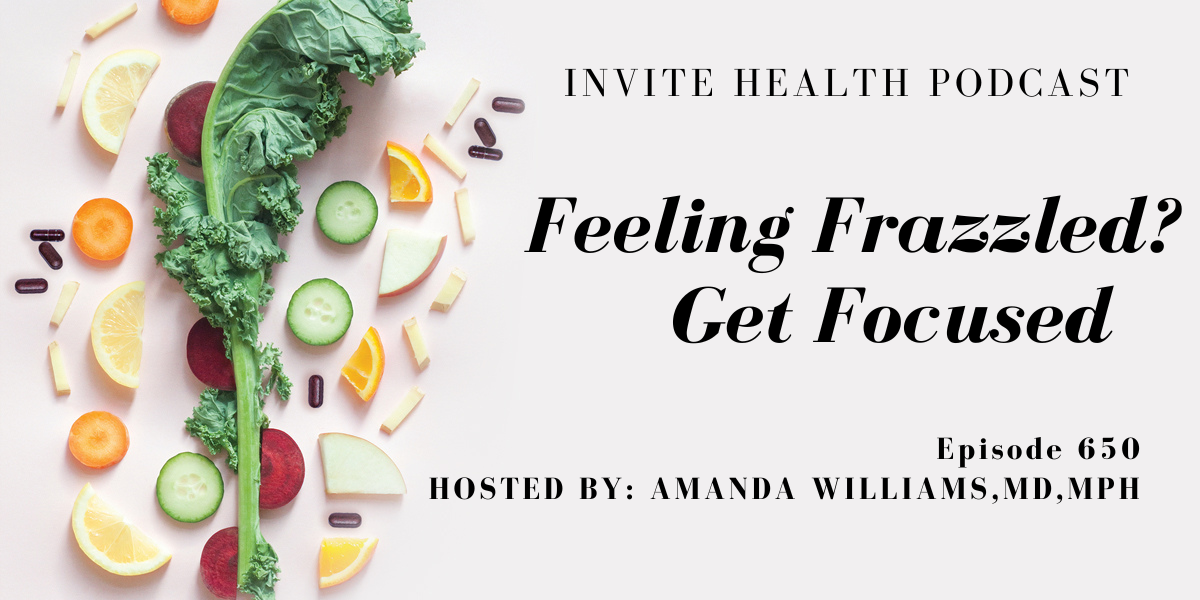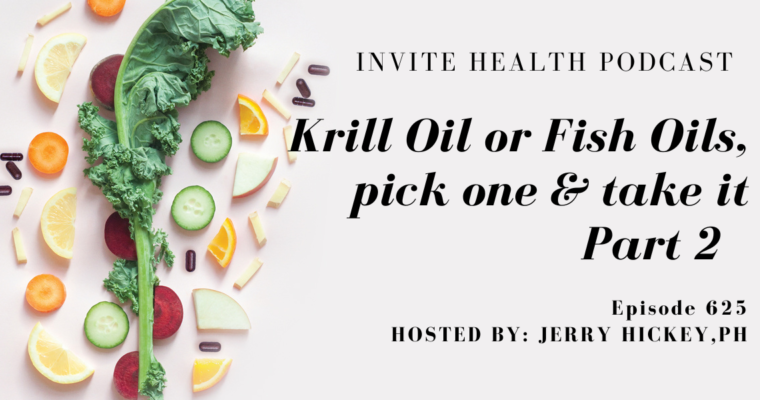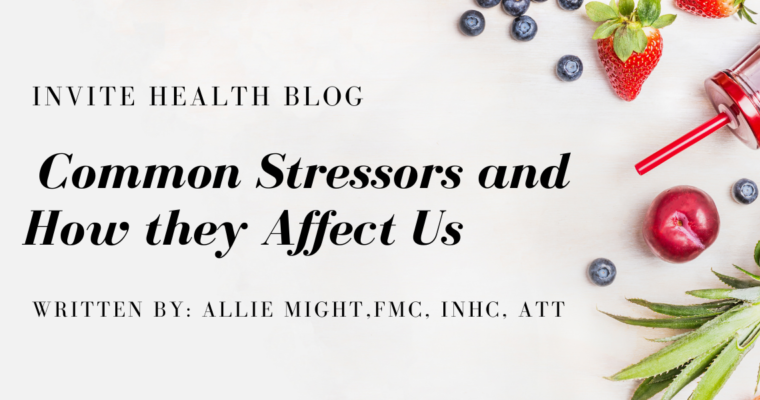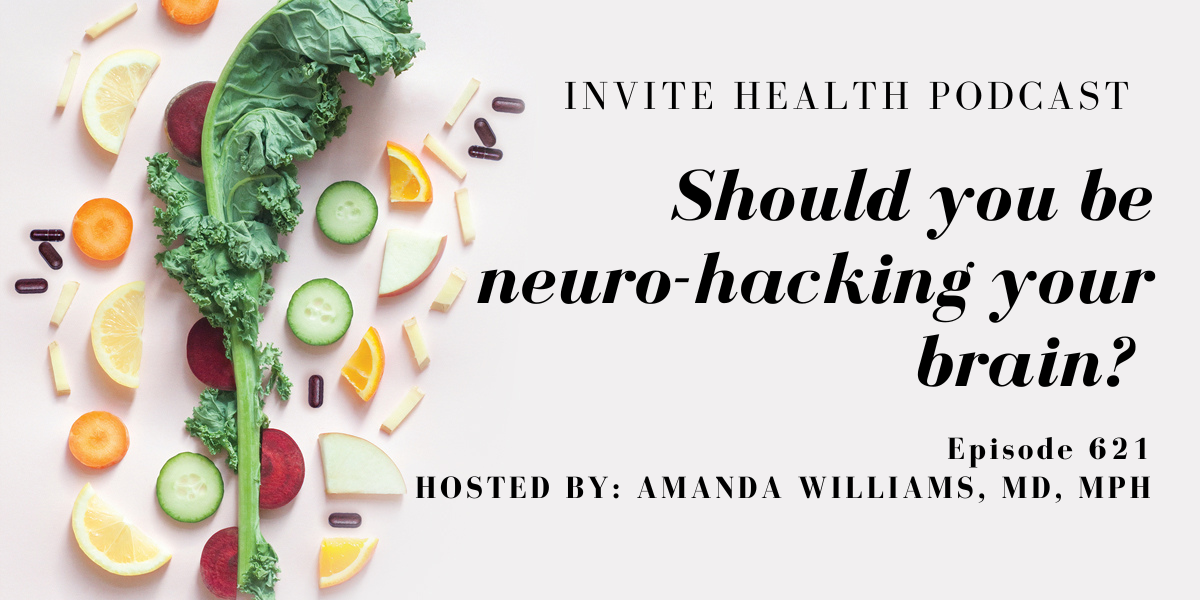Please see below for a complete transcript of this episode.
SHOULD YOU BE NEURO HACKING YOUR BRAIN? INVITE HEALTH PODCAST, EPISODE 621
Hosted by Amanda Williams, MD, MPH.

*Intro Music*
InViteⓇ Health Podcast Intro: [00:00:04] Welcome to the InViteⓇ Health Podcast, where our degreed health care professionals are excited to offer you the most important health and wellness information you need to make informed choices about your health. You can learn more about the products discussed in each of these episodes and all that Invite Health has to offer at, www.invitehealth.com/podcast. First time customers can use promo code podcast at checkout for an additional 15% off your first purchase. Let’s get started. † [00:00:34]
*Intro Music*
Amanda Williams MD, MPH: [00:00:40] When it comes to aging, there is a common concern that many people have, and that is they want to remain sharp, want your brain to be functioning, firing on all cylinders as I like to say, as we get older. We know that there’s a lot of things that we can do to help prevent the decline in cognitive function as we grow older, we can look at different techniques that certainly have been shown to be beneficial. We can certainly look at the foods that we are eating, and I want to talk a little bit about neuro hacking today, because this is something that has kind of gained a lot of momentum over the course of the past decade. And many individuals are really starting to dive in to this whole thought of what can I do to maintain brain health? So we’re going to talk about some of the different nutrients that can clearly be advantageous to stave off age related diminishment of brain function and of course, what we can be doing to maintain our cognitive reserves, so I am Dr. Amanda Williams, scientific director at InVite Health. And neuro hacking is also sometimes related to or called brain hack, and this is an attempt to optimize our brain function and enhance cognitive performance. So this can be undertaken with different goals in mind. But generally speaking, most people want to have a better firing brain and this might happen to younger folks who are in college and want to do better for overall academic performance, and they try different brain techniques to enhance their recall, for example. So any of the things that we can do to attempt to improve upon brain function and mental performance, we can kind of categorize as neuro hacking. And there’s much clinical research out there now that is zeroing in on hacking the brain and the dimensions of cognitive enhancement.† [00:02:48]
MENTAL FATIGUE, INVITE HEALTH PODCAST, EPISODE 613>>LISTEN NOW!
[00:02:49] There was a fascinating research study that was conducted a couple of years ago that dove into this, looked at the dimensions of cognitive enhancement and the physical components to this, the behavioral components, the biochemical components to this, and this is where we can start to look at those lifestyle modifications, the healthy eating, the exercise, why more research is being done as to the brain connectivity when it comes to exercise, for example, we know that that helps to release those feel good neurotransmitters, that dopamine release, but there’s a lot of complex information that occurs within the brain. And we know there’s a lot of things that we can do that can disrupt that complexity, certainly poor diet, sedentary lifestyle can lead into all of this chronic inflammation. Excessive damage brought on due to free radicals as well as inflammation and glycation can all lead to problems with lowered cognitive function as we grow older. But we know that there’s a lot of different strategies out there that they are assessing to see how our brain is working and how we can improve that. How do we make it even faster that we don’t want to lose this because of the process of aging? And this is where this whole new side of science, this neuro hacking or brain hacking has come into play, looking at the different dimensions, the cognitive domain, looking at the availability of different actions that can help to enhance the way that the brain is working as we grow older and, you know, different nutrients that help to enhance that neural signaling, the release of those powerful neurotransmitters, and this is where we start to look at the different nutrients, including omega three fatty acids. We have to look at mental fatigue in the different regions of the brain that get impacted because of high stress and just feeling run down. We have to look at the learning and the memory components, the hippocampus, which plays a crucial role in learning and memory. So there’s all of these moving parts in different areas within the brain that we know can be enhanced or strengthened. It’s kind of like doing brain exercises, we’ve all probably heard that as you get older, doing crossword puzzles or word lines can be very helpful. And, you know, finding new, exciting hobbies where you’re learning new things. There’s many individuals who will go and take a course you know, maybe they already have their degrees, already worked a full career, but they want to stay sharp. So they’ll go and take you know, college class and learn something new. So we know that these things have existed for a long time, but to focus on nutritional neuro hacking or brain hacking, this is this new area of scientific research that really is quite progressive in terms of enhancing your brain function and the utilization of different nutrients to help us get over that feeling tired, you know, the utilization of things like Rhodiola, where we have a lot of mental fatigue and problems with focus. So the use of inositiol, and ginkgo biloba can be very, very beneficial. How nutrients such as Blueberry Extract, those powerful purple anthocyanins can be very helpful when it comes to learning and memory. So we look at focus tired, memory, stress, all of these. And we say, well, what nutrients can we add in to our daily routine? We start to turn towards things outside of our diet, and if we eat a Mediterranean Diet where we are incorporating in those high fiber foods, those powerful vitamins and minerals provided from those wonderful fruits and vegetables, the seeds and the nuts, the healthy fats that help to protect the brain as we get older, to maintain that brain volume. Well, we can also look at different nutrients,such as acetyl-L-carnitine, so we have our alpha Lipoic acid combined with our Alcar, so Alcar with ALA, and we know that this is important for cellular fat metabolism as well as for energy production with inside of the cell within the mitochondria itself, we can see that those folks who have utilized, Alcar, acetyl-L-carnitine get a significant improvement on mental fatigue. So maybe they said, yeah, I just don’t feel as sharp, my brain feels kind of tired. They start to utilize Alcar, and they say, wow, you know, I feel like I have more energy, I feel like I’m more focused.† [00:07:48]
[00:07:49] We can clearly look at the addition of a formulation such as mind synergy or the cerebral care formulation and the powerful blend of those nutrients to enhance neuronal connectivity. The use of Phosphatidylserine and Phosphatidylcholine, these key fats that help to maintain the structure of your brain cells as you get older. And think about all the stress that we throw at our brain throughout our life. So we want to be able to stay focused, stay sharp, create new memories, maintain old memories. We have to take care of our brain and we do this through the action of neuro hacking, we think about the exercise that we’re going to do the next day and how that’s going to help reduce our stress level and release those powerful neurotransmitters, those feel good hormones that get released. We look at the incorporation of carotenoids, lutein and zeaxanthin. Oftentimes we think of them in the setting of eye health, but we definitely can see how these two powerful carotenoids do so much for our brain tissue and when taking them together can help to lower the amount of inflammation in the brain, just those two nutrients, those two carotenoids, lutein and zeaxanthin, they make up about 75% of the carotenoids found within the brain. So it would be incredibly advantageous to be taking a formulation that contains lutein and zeaxanthin.†[00:09:24]
ICYMI:CHOLINE, THE BRAIN BOOSTING NUTRIENT, 90% OF US LACK, INVITE HEALTH PODCAST, EPISODE 597>>LISTEN NOW
[00:09:26] The scientific research on different nutrients such as Curcumin, for example shown to have very powerful cognitive benefits. The study that was conducted in men and women between the ages of 45 years old and 74 years old. And they found that when they were taking curcumin on a daily basis for 12 weeks, they started to have it improved working memory, decreased fatigue in the brain. Ginkgo biloba, which really helps to enhance the proper blood flow and oxygenation to our brain. These are all key ways that we can practice healthy neuro hacking. The incorporation of just our basic vitamins and minerals can offer a significant amount of support, along with omega three fatty acids. Oftentimes we think about fish oil, we’re thinking in that setting of cardiovascular support. But we know that those omega three fatty acids are helping the brain remain nice and full, which is why we have so many formulations that are geared towards optimizing those neuronal connections and supporting and maintaining the cellular function in chemical pathways and enzymatic pathways in the brain, all of which have been studied and shown to be highly effective. So I oftentimes will partner up that cerebral care formulation, which contains acetyl l-carnitine along with inositol, inositol is very powerful way to yield a positive cell to cell communication pathway in the brain. So for those who do have a hectic job or a hectic lifestyle and you feel mentally drained, incorporating in one scoop of that cerebral care each day along with mind synergy, can pack a punch when it comes to that brain hacking. So we can learn more, so we can remember more so we have better stress resilience. So when we are stressed out at work, maybe you’re in a traffic jam and you’re stressed out that the brain can respond better to that, so you don’t end up with mental fatigue we have to zero in on those nutrients that help to support neuroplasticity, the brain’s ability to form new connections and to strengthen itself, we know that those key phospholipids, that phosphatidylcholine,the Phosphatidylserine do a wonderful job when it comes to allowing the brain to have better neuroplasticity. At the end of the day, we want to enhance our brain’s metabolic function, we want to enhance our critical thinking, support a better mood response, increase our focus. And of course reduce the amount of mental stress and brain fog that we have in order to have the ability to age in a more graceful way. So as we continue to watch this new progressive research field of hacking the brain or neuro hacking, it will be very interesting to see how many more components we start to find, that affect the biochemical pathways, the physical pathway, as well as the behavioral pathway. But for now, what we do know is that we can eat healthy foods through the adherence of a Mediterranean diet. We can help to support our body stress response through having daily physical activity, and we can incorporate in these powerful brain boosting nutrients such as the cerebral care formulation and the Mind Synergy, as well as looking at formulations such as the Alcar with ALA. So stick around on this topic because there is more to come, that is for sure. But I do want to thank you so much for tuning in to the InViteⓇ Health Podcast. Remember, you can find all of our episodes for free wherever you listen to podcasts or by visiting Invitehealth.com/podcast. Do make sure that you subscribe and you leave us a review. You can follow us on Facebook, Twitter and Instagram at Invite Health. And we will see you next time for another episode of the InViteⓇ Health Podcast.†[00:09:26]
*Exit Music*


